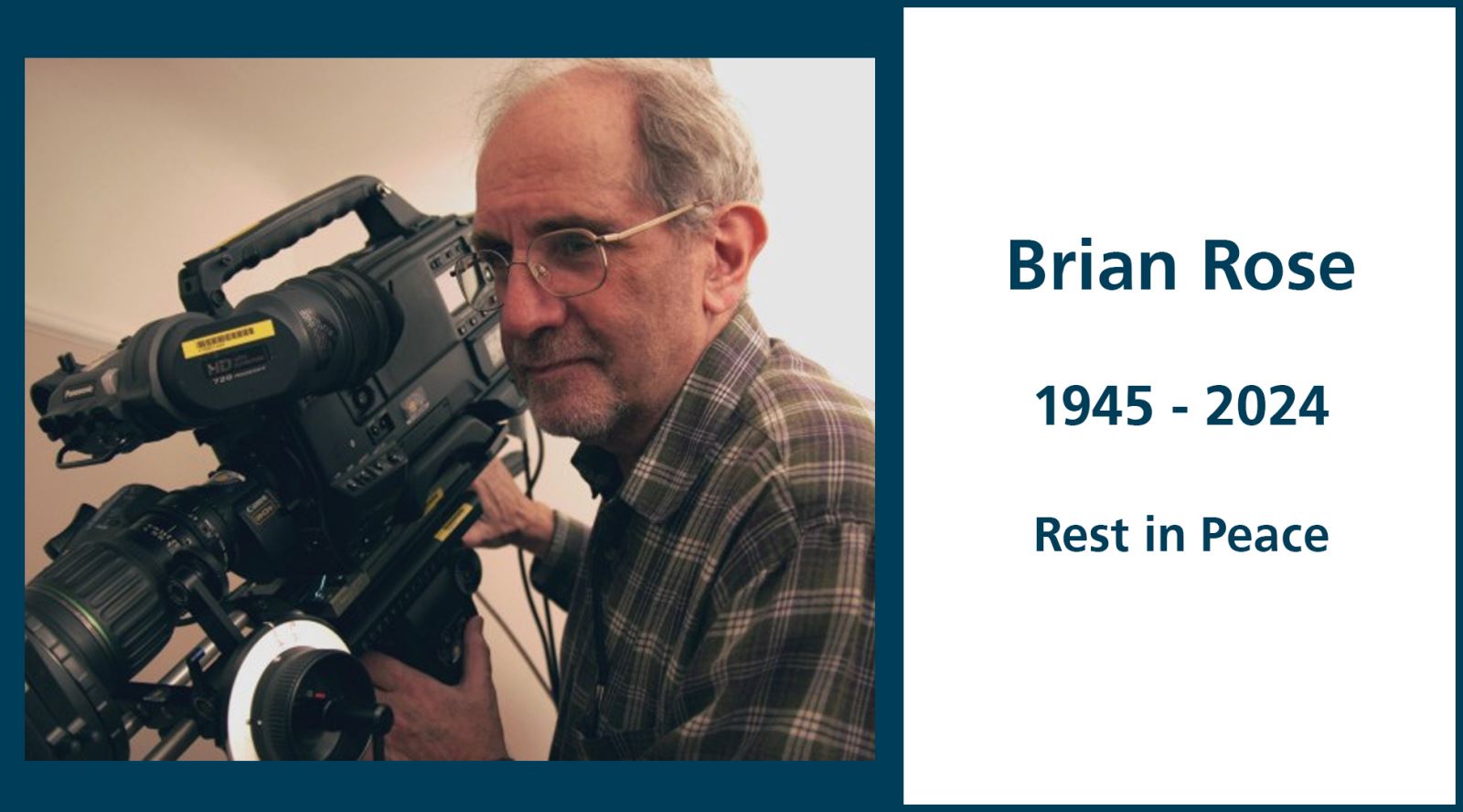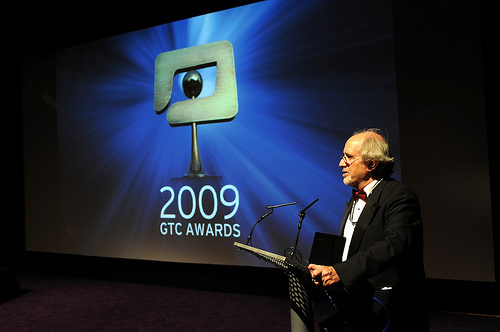Coming Up

-
GTC Drone Workshop
27 Jan 26 @ Online

-
DJI Ronin 4D Masterclass: Experience Cinematic Freedom
4 Feb 26 @ London, W1W 6RN

-
DJI Ronin 4D Masterclass: Experience Cinematic Freedom - March
4 Mar 26 @ London, W1W 6RN

-
MPTS 2026
13 May 26 @ London, W14 8UX

Sponsor News
Remembering former GTC Chair, Brian Rose

Sadly our past Chair and Council member of many years, Brian Rose, passed away on Wednesday 15 May. Having collapsed originally on Easter Sunday he was taken to Northwick Park Hospital, Harrow, where biopsies confirmed advanced cancer in his liver.
Over the decades, Brian was a selfless supporter of the GTC, donning a number of hats both on Council and quietly behind the scenes and he helped to shape and steer the organisation to where it stands today.
The Celebration of Brian's Life
Brian’s funeral, which he helped to plan with zest and humour will be on:
Date: Thursday 30 May
Time: 1.15pm – 2.15pm
Service: To be held at Breakspear Crematorium, Breakspear Road, Ruislip HA4 7SJ
Reception: Arens Bar & Grill, Ducks Hill Road, Ruislip HA4 7TS.
Webcast Login Details:
https://watch.obitus.com
Username: voze5912
Pin: 399339
Family have requested no flowers, however, if you’re able to attend you are welcome to bring flowers from your garden to place on the coffin.
Donations are welcome to St Luke’s Hospice or SGI-UK one of Brian’s projects at Taplow.
Please contact Susan Bennett, Brian’s sister if you can attend so the family have an idea of numbers:
Telephone: 020-8883 8540
Email: email: suebearlh@yahoo.co.uk
Undertakers: shantifuneralservices@gmail.com
Susan has told the GTC, "He wanted it to be colourful and fun... so please wear your glad rags. There is a link to the webcast... so you can join in wherever you are!"
From an early age, Brian was very keen on photography. After leaving school, he went to Harrow Technical College and after he graduated in 1963, the National Physical Laboratory took Brian on as a scientific photographer, a job he enjoyed and from which he learnt a great deal.
Brian loved the idea of working in film and in the mid 1960’s he started as a trainee sound assistant at the Brent Film laboratories in Cricklewood, London. His work there had the added advantage of being admitted into the ACTT and gained him the all-important ‘union card’. With resolute determination and never giving up on his dreams, Brian managed to transfer into the union’s camera department and started working as a clapper loader on industrial documentaries. His big break came in 1976, when he started working for British cinematographer, Larry Pizer, first as his clapper loader, then focus puller, before eventually being made up to camera operator (and 2nd unit DoP).
Brian greatly enjoyed shooting aerials, including filming for renowned aerial camera specialist Peter Allwork. One particularly memorable job was assisting Peter in shooting the ‘plates’ for the 1978 Superman feature film from a Learjet above Switzerland.
One of the industry’s legends was Michael Samuelson. Michael was also President of the Variety Club, as well as being involved with various other charities alongside his brothers David and Sydney. Brian told of how, through his involvement with the Guild of British Camera Technicians (GBCT), he would often receive a phone call from Michael’s secretary, in which she’d tell him about whichever charity job they had coming up next and needed covering, to which she’d add: “And you’re doing it!”. Brian recalled two particularly noteworthy occasions, the first being when he was informed that he was going to film the Duke of Edinburgh. The second was when Brian discovered he was going to produce a film for the Variety Club, that would feature a major fundraising event. In Brian’s own words:
This was really dropping me in at the deep end, but it was a real highlight of my career.
When asked which was the most memorable feature he worked on, he said ‘Full Metal Jacket’, directed by Stanley Kubrick, with Brian as focus puller, although, he added:
It wasn’t easy at all, it was hell!
Brian said he had been more scared of Kubrick than the drill sergeant-major in the film. Brian did commend the director for his authentic portrayal of war scenes in Full Metal Jacket, the action set pieces for which were shot at Beckton Gas Works in East London. He told Kubrick how realistic he’d found being on set filming the battle scenes, as it had really reminded him of his own time spent as a press photographer in Israel, two years after the Six Day War, which had been a pretty terrifying experience.
With a career change in 1988, Brian became the editor of Video Action!, one of the first video magazines aimed at the consumer market. This was followed by working as a producer, having set up his own production company. However, these were challenging times and unfortunately, his new venture failed, so he started to look for a new career. Brian had two job offers to consider, either as a producer on a new BBC strand, or to join a broadcast rental company. Being a Buddhist, Brian came to a decision through chanting, and the ‘wisdom’ was to take the job at OpTex Rental, where before too long he became their Technical Manager. It was through his work at OpTex that Brian first became a member of the GTC. This was an exciting time in the television industry, especially when, as Brian recalls, Sony introduced its new Digital Betacam camera in 1993. Brian believed that this was the beginning of the ‘digital cinematography’ age and part of Brian’s role was to help DoPs understand and fully embrace this new format, because he could speak their ‘language’. Being such a proactive supporter of our camera craft, Brian was soon co-opted onto the GTC Council.

Brian often reflected how we can easily forget how privileged we are to work in this industry. At the time of the GTC’s 50th anniversary, Brian offered his thoughts, “We have a lot to be incredibly proud of with the Guild; it’s going from strength to strength”. He added a typically insightful observation: “Television has changed, television isn’t radio with pictures, it’s pictures with sound.”
Having retired, Brian always retained his interest in sound, and started recording monthly magazine shows for the visually impaired members of his Buddhist organisation. One day, whilst visiting Northwick Park Hospital, Brian spotted a poster advertising Radio Harrow, which piqued his interest. After making some enquiries, he joined the organisation and, before long, started producing his own show, as well as becoming the technical manager for the station’s outside broadcast events. He’s thoroughly enjoyed expanding his skillset in front of the mic through hosting his shows, chatting on air with a variety of people on a broad range of topics. It’s earned him the nickname “the Jeremy Paxman of Radio Harrow”.
Current GTC Chair, Graham Maunder, remembered when he first got more involved with the Guild, Brian was always very welcoming and interested in what he was up to and the latest advances in technology, whilst always being an amazing resource of days gone by. He added:
Brian was a very humble man and has worked with some of the true greats during his career and latterly been brilliant with his local hospital radio.
GTC President John Henshall added:
Brian was an outstanding man and a stalwart of our Guild with a sense of humour and knowledge second to none.
Brian greatly enjoyed his time running the Guild’s Council and served as both Vice-chair and Chair of the GTC. He was also our very first Welfare Officer. Our current Welfare Officer, Chris Yacoubian, chatted with him shortly after his prognosis and said, “he is still being the Brian we all know and love, cracking jokes and openly discussing his condition. He told him:
As a Buddhist I am looking forward to the next incarnation to continue doing good things on my next mission…
Brian will be greatly missed by those he leaves behind but can rest in peace knowing that he himself has helped shape many careers in our own industry.
Where to next?
Coming Up

-
GTC Drone Workshop
27 Jan 26 @ Online

-
DJI Ronin 4D Masterclass: Experience Cinematic Freedom
4 Feb 26 @ London, W1W 6RN

-
DJI Ronin 4D Masterclass: Experience Cinematic Freedom - March
4 Mar 26 @ London, W1W 6RN

-
MPTS 2026
13 May 26 @ London, W14 8UX













